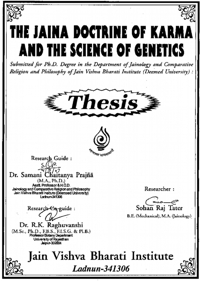From the practical point of view, people prefer puṇya to pāpa and therefore engage themselves in such acts and thoughts that bring in puṇya for following reasons:
- Good activities bring puṇya and bad activities pāpa.
- Happy and comfortable situations like handsome and strong or beautiful and graceful body, good health, attractive and loving spouse, children to be proud of, wealth, amenities, to be born in higher family, longer life span etc. are due to puṇya, unwholesome karmas on the other hand would result in unhappy and miserable situations like uglyness, illness, quarrelsome and wicked spouse, uselessness and the destructive ghātikarmas.
- Fruit of puṇya is pleasure and fruit of pāpa is painful. From the realistic point of view, both puṇya and pāpa lead the soul further into saṁsāra because:
- Both are caused by impure activities of the soul.
- Both are karmic material in nature.
- Fruition of both is harmful to the real happiness of soul.
- Both lead towards the path of bondage
As long as soul is embodied, it does not indulge in some or other activity. This activity may be physical or mental or both. It is possible that a person may retain from physical activity to some time. His mental apparatus however never rests. It functions even when he sleeps. Every activity involves karma and he has to bear consequences thereof sooner or later. Because of ever presence of karmas (karmaṇa body) the subtle vibration of soul creator an adhyavasāya (primal drive—unconscious mind) that affects the psychic colors (leśyā). These psychic colors depending upon its nature, good or bad, generate passionate thoughts that may translate in good or bad activities. These activities are responsible for influx and bondage of good or bad karmas. Good as well as bad bondage of karmas hinder the purity and freedom of soul. Puṇya bondage is like hand-caffs made of gold and the pāpa bondage is like iron hand - caffs, causing the soul to wander in the cycle of birth and death, because fruit of good or bad karmas have to be born. Therefore a true believer should treat puṇya and pāpa as an obstruction to attaining mokṣa, the path of liberation, and true nature of the soul. Thus he should always be absorbed in the "self" (endeavor for the activities that stop and eradicate karmas). However when jiva is in the lower spiritual stages (guṇasthāna), long continued self-absorption is not possible. That time he should restore to puṇya-good deeds, such as devotion to panca parmeṣthī, services to Jaina ascetics and study of scriptures in order to keep away pramāda. However he should continue his efforts to attain the status of self-absorption. [22]
(a) Four fold combination of puṇya and pāpa
(b) Preference of Puṇya over PāpaConcept of puṇya and pāpa are more or less identical in most of religions. The later concept is however more subtly treated in Indian Philosophy. The take into consideration not only the actual act but also the intentions behind it. They are unanimous in adoring the meritorious intentions and activities and in condemning the sinful ones. In major respect however Jainism differ from other in its approach to puṇya or meritorious activities. One may obtain material happiness and comforts as a result of puṇya, but what after death? Material happiness does come to end and comfortable situations do not last for ever. One has therefore to undergo miseries at the expiration of puṇyakarmas, unless he has earned other puṇyakarmas meanwhile. This earning of new puṇyakarma while enjoying the fruits of earlier ones is known in Jaina terminology as punyānubandī puṇya or wholesome karmas motivating further wholesome activities.
Very few persons fall with in the category of Puṇyānubandhī puṇya, because most of persons get infatuated by the happiness and comforts. By virtue of infatuation they indulge in unwholesome activities. This type of puṇya is known as Pāpānubandhī puṇya or wholesome karmas leading to unwholesome ones. Misery is thus destined for them in the near future. How can one avoid this situation? If the objective is to attain liberation, one has to avoid all sorts of karmas. There is no other alternative in ultimate analysis. Jainism therefore lays down avoidance of wholesome karmas as well.[23]
The wholesome as well as unwholesome karmas cause bondage to which soul gets chained. Both of them come in the way of soul's liberation and are to be avoided as such. This can be done by cultivating sense of detachment in all possible situations, favourable as well as unfavourable. No situations lasts forever and every conceivable situations comes to an end sooner or later. Why then get infatuated or feel miserable in a situation, which is ephemeral? If a person stays tuned to such detached attitude and maintains equanimity, he does not attract new karmas. His earlier karmas would steadily drip off as he bears their consequences. In due course he would therefore shake off all karmas. As such, he proceeds on the path of liberation. Unfortunately however it is not possible for a worldly soul to stay continuously tuned to its true nature very long. The Tīrthankaras have stated that no one can continuously concentrate on any object more than two ghadies or 48 minutes. Beyond that time the attention reverts to other aspects. During period of such reversals a person may better be involved in wholesome activities instead of indulging in unwholesome ones. There in lies the preference of puṇya over pāpa.[24]
 Prof. Dr. Sohan Raj Tater
Prof. Dr. Sohan Raj Tater
 Doctoral Thesis, JVBU
Doctoral Thesis, JVBU